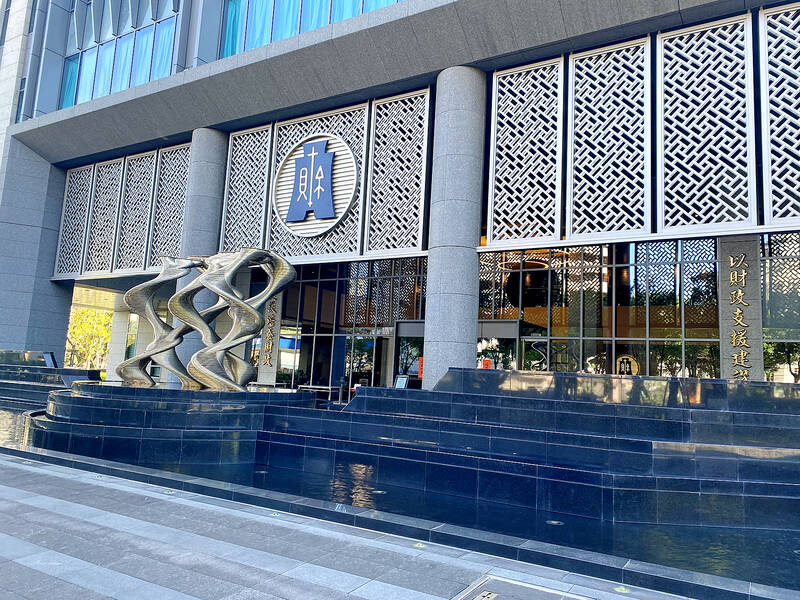Tax revenue last month declined 9 percent from a year earlier to NT$332.4 billion (US$10.31 billion), as an economic slowdown weighed on corporate and personal income taxes, although securities transaction tax continued a rebound, the Ministry of Finance said yesterday.
Corporate and personal income tax revenue shrank 28.5 percent and 3.9 percent year-on-year to NT$116.9 billion and 42.5 billion respectively, ministry statistics official Liang Kuan-hsuan (梁冠璇) told an online news briefing.
Firms are less active in setting aside tax expenses this year due to poor sales, while the Mid-Autumn Festival contributed to the delay the last month, Liang said.

Photo: Clare Cheng, Taipei Times
Lackluster corporate earnings in turn dampened cash dividends, which fell 13 percent from a year earlier, accounting for the drop in personal income, she said.
Still, personal income tax revenue in the first nine months of the year already exceeded the ministry's target for the entire year, and so did business, inheritance, stamp and house tax revenues, Liang said.
The business tax revenue last month grew 11 percent to NT$105.9 billion from a year earlier and expanded 5.9 percent in the first nine months from the same period last year to NT$469.1 billion, as local financial service providers benefited from interest rate hikes at home and abroad, Liang said.
Sales taxes last month picked up 6.3 percent annually to NT$12.9 billion, mainly aided by strong demand for imported cars, she said.
Securities transaction tax revenue last month spiked 24.5 percent year-on-year to NT$15.7 billion as daily turnover soared 27.6 percent to N$312.7 billion, ministry data showed.
Overall stock investment interest strengthened compared with a year earlier, although artificial intelligence-related plays saw significant price corrections, Liang said.
On the other hand, land value incremental tax revenue, a gauge of property market health, edged up 2 percent to NT$6.1 billion last month after the number of taxable cases rose 5.1 percent to 40,741, she said, suggesting a neutral reading of the changes.
Cumulative tax revenue amounted to NT$2.79 trillion in the first nine months, a 6.3 percent increase from the same period last year and ahead of the ministry's budget schedule by 12.3 percent.
The state coffers might collect excess tax revenue of NT$100 billion this year in the absence of major shocks, the ministry said.

SEMICONDUCTORS: The German laser and plasma generator company will expand its local services as its specialized offerings support Taiwan’s semiconductor industries Trumpf SE + Co KG, a global leader in supplying laser technology and plasma generators used in chip production, is expanding its investments in Taiwan in an effort to deeply integrate into the global semiconductor supply chain in the pursuit of growth. The company, headquartered in Ditzingen, Germany, has invested significantly in a newly inaugurated regional technical center for plasma generators in Taoyuan, its latest expansion in Taiwan after being engaged in various industries for more than 25 years. The center, the first of its kind Trumpf built outside Germany, aims to serve customers from Taiwan, Japan, Southeast Asia and South Korea,

Gasoline and diesel prices at domestic fuel stations are to fall NT$0.2 per liter this week, down for a second consecutive week, CPC Corp, Taiwan (台灣中油) and Formosa Petrochemical Corp (台塑石化) announced yesterday. Effective today, gasoline prices at CPC and Formosa stations are to drop to NT$26.4, NT$27.9 and NT$29.9 per liter for 92, 95 and 98-octane unleaded gasoline respectively, the companies said in separate statements. The price of premium diesel is to fall to NT$24.8 per liter at CPC stations and NT$24.6 at Formosa pumps, they said. The price adjustments came even as international crude oil prices rose last week, as traders

SIZE MATTERS: TSMC started phasing out 8-inch wafer production last year, while Samsung is more aggressively retiring 8-inch capacity, TrendForce said Chipmakers are expected to raise prices of 8-inch wafers by up to 20 percent this year on concern over supply constraints as major contract chipmakers Taiwan Semiconductor Manufacturing Co (TSMC, 台積電) and Samsung Electronics Co gradually retire less advanced wafer capacity, TrendForce Corp (集邦科技) said yesterday. It is the first significant across-the-board price hike since a global semiconductor correction in 2023, the Taipei-based market researcher said in a report. Global 8-inch wafer capacity slid 0.3 percent year-on-year last year, although 8-inch wafer prices still hovered at relatively stable levels throughout the year, TrendForce said. The downward trend is expected to continue this year,

POWERING UP: PSUs for AI servers made up about 50% of Delta’s total server PSU revenue during the first three quarters of last year, the company said Power supply and electronic components maker Delta Electronics Inc (台達電) reported record-high revenue of NT$161.61 billion (US$5.11 billion) for last quarter and said it remains positive about this quarter. Last quarter’s figure was up 7.6 percent from the previous quarter and 41.51 percent higher than a year earlier, and largely in line with Yuanta Securities Investment Consulting Co’s (元大投顧) forecast of NT$160 billion. Delta’s annual revenue last year rose 31.76 percent year-on-year to NT$554.89 billion, also a record high for the company. Its strong performance reflected continued demand for high-performance power solutions and advanced liquid-cooling products used in artificial intelligence (AI) data centers,